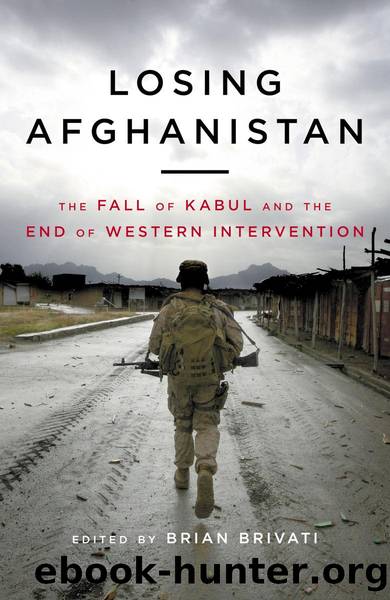Losing Afghanistan: The Fall of Kabul And The End of Western Intervention by Brian Brivati

Author:Brian Brivati
Language: eng
Format: epub
Publisher: Biteback Publishing Ltd
Published: 2022-01-15T00:00:00+00:00
INDIAN STAKES IN AFGHANISTAN
Since the fall of the Taliban regime in 2001, India has committed humanitarian and development assistance of over $3 billion, under which more than 500 infrastructure and development projects have been completed in Afghanistan.33 India always supported the political solution for Afghanistan, but its ideas of a political solution and the Taliban as a political force were different from other regional countries. India has sought inclusivity, rights for women and grass-roots social contact for the development of Afghanistan.
After the opening of the Taliban office in Qatar in June 2013, the Indian foreign ministryâs statement read, âThe reconciliation process should not seek to create equivalence between an internationally recognised Government of Afghanistan and insurgent groups.â34 Indiaâs stand was based on the fact that besides the US, which is an external power, regional actors like China, Pakistan and Russia provided legitimacy to the Taliban by directly engaging with it while eroding the credibility and confidence of the democratically elected Afghan government. In his speech at the Ministerial Conference of the Heart of Asia â Istanbul Process in March 2021, Indiaâs foreign minister highlighted that conferring legitimacy or sanctions required a collective approach: âCollective success may not be easy, but the alternative is only collective failure.â35
Axiomatically, the same countries which engaged with the Taliban are now asking for the release of international assistance to Afghanistan as the humanitarian crisis is exacerbated by the failing economy and the heightened risk of terrorism. The reality is that the Taliban-led interim government has little accountability towards the people and continues to rule by fiats.36
Indiaâs idea of positive peace has a more plurilateral approach as it talks about âdouble peaceâ â that is, peace within Afghanistan and peace around Afghanistan, but not without accountability. Therefore, unlike China and Pakistan, which have already started providing aid to Afghanistan, India has called on a fair distribution of aid to all Afghans, with its foreign minister saying, âIt is therefore essential that humanitarian assistance providers are accorded unimpeded, unrestricted and direct access to Afghanistan.â37
In the past two decades, India has invested political and economic capital to operationalise the North-South Transport Corridor, of which the Chabahar port in Iran is a vital connector. However, the Taliban takeover has reignited Indiaâs concerns regarding the impact of the change of the guard in Kabul on regional prosperity, which is linked with security. Under the previous Taliban regime, anti-Indian terrorist organisations like Lashkar-e-Taiba used al-Qaeda infrastructure to train their cadres similar to the Chinacentric ETIM, the Russia-centric Chechen groups and now Daeshâs Khorasan chapter, which are threatening the whole region. The refugee issue, the drugs trade, the geopolitical competition to fill the political void left by the US and the smuggling of small arms are some other concerns India shares with regional partners.
Unlike other countries, India maintained its strategic autonomy in Afghanistan. In the past, India worked with Russia, Iran, China and the US. In the new geopolitical realities, the SinoâPak nexus seems dominant, Russia and Iran are on the defensive
Download
This site does not store any files on its server. We only index and link to content provided by other sites. Please contact the content providers to delete copyright contents if any and email us, we'll remove relevant links or contents immediately.
The PFLP's Changing Role in the Middle East by Harold M. Cubert(144)
100 myths about the Middle East by Fred Halliday(133)
Revolution Without Revolutionaries by Bayat Asef(109)
US Nation-Building in Afghanistan by Conor Keane(104)
The Emergence of the Gulf States by J. E. Peterson(96)
Islam, Nationalism and Communism in a Traditional Society by Gabriel Warburg(84)
A Grammar of Ugaritic by John Screnock; Vladimir Olivero(77)
All the World Is Awry by R. Kevin Lacey(67)
The Islamic Polity and Political Leadership: Fundamentalism, Sectarianism, and Pragmatism by Mehran Tamadonfar(65)
Islam, Nationalism and Communism in a Traditional Society: The Case of Sudan by Gabriel Warburg(51)
Islamic Law in Circulation by Mahmood Kooria;(46)
Amazigh Politics in the Wake of the Arab Spring by Bruce Maddy-Weitzman(34)
